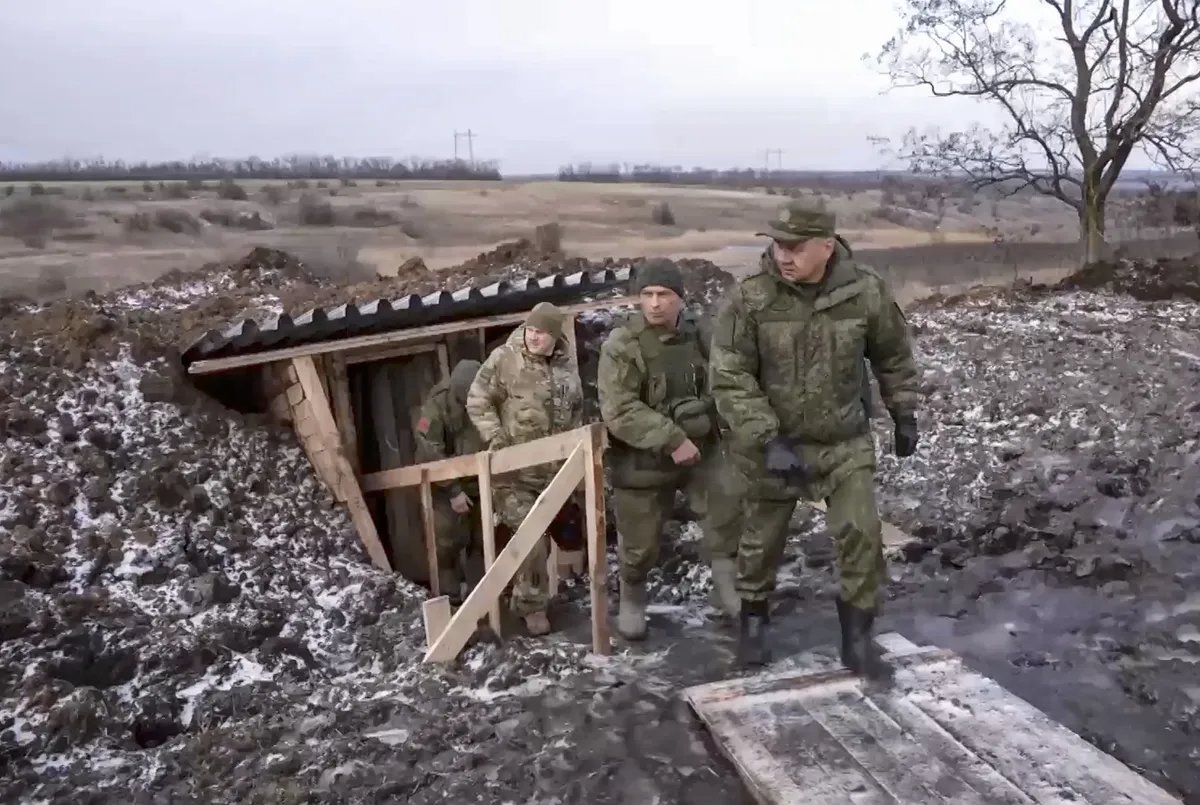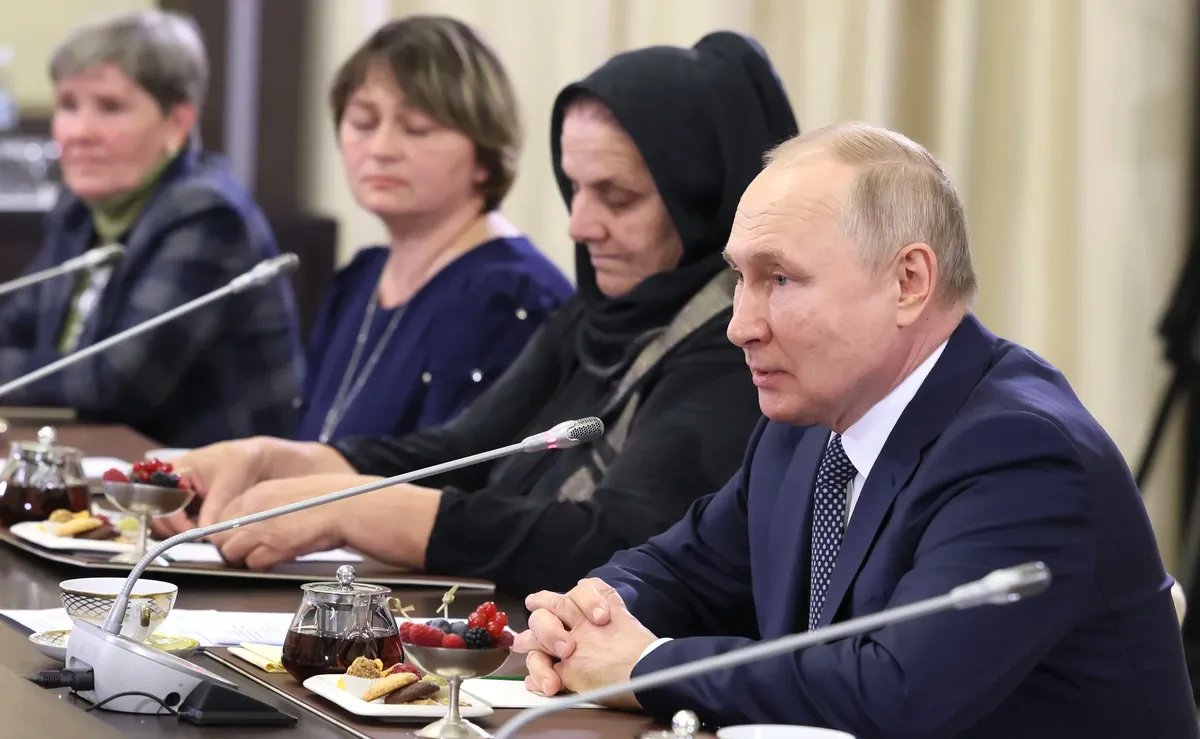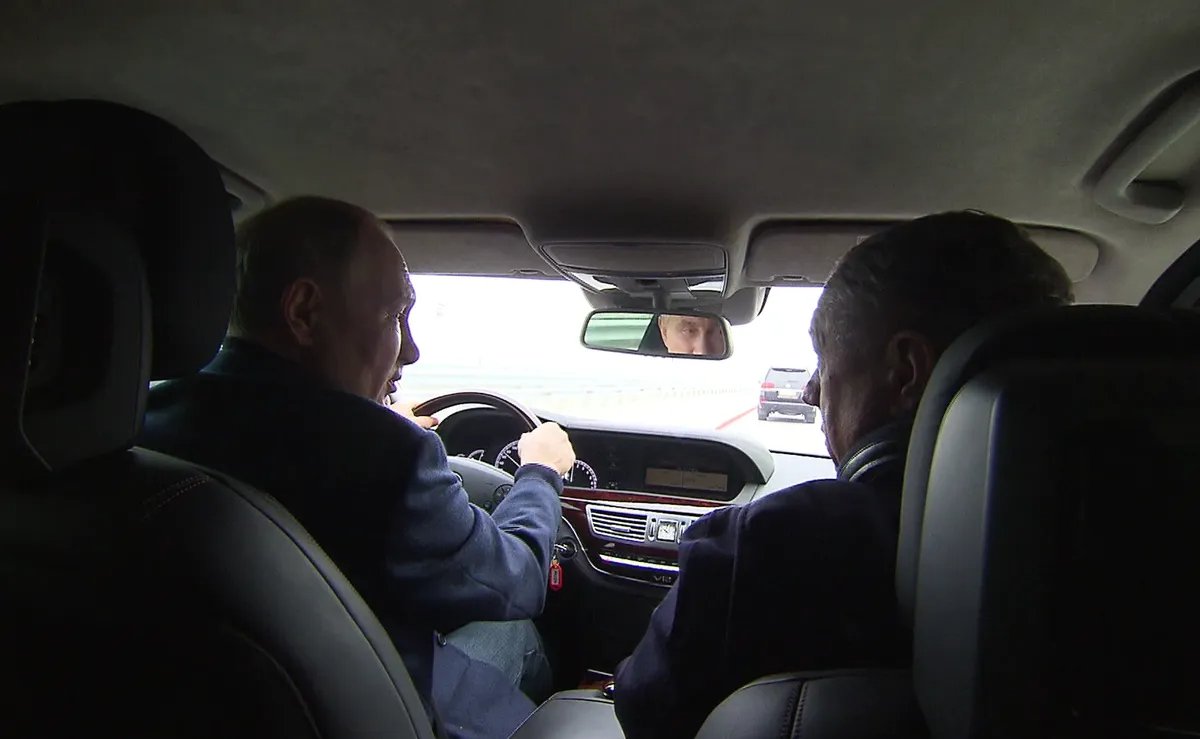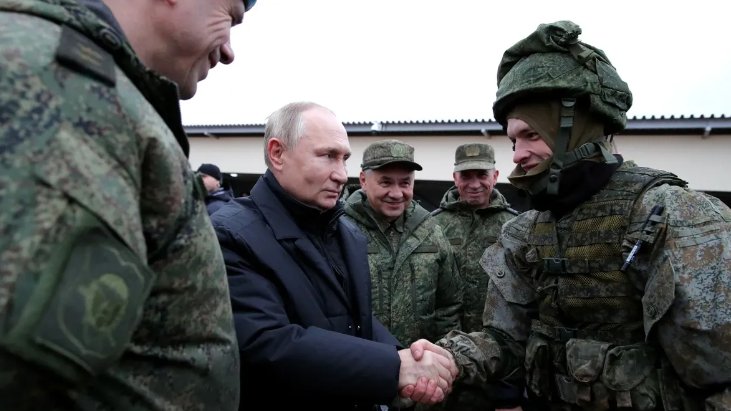Almost immediately after Ukraine’s Volodymyr Zelensky arrived at the frontlines and handed out military awards to distinguished Ukrainian fighters in Bakhmut, Kremlin spokesman Dmitry Peskov said that the Russian leader also travelled to the “special military operation” zone. It was earlier reported that the president personally gave instructions to high-ranking generals in the Russian group headquarters.
However, thorough and meticulous researchers quickly discovered that the video footage shown by the Kremlin was made in the Southern Military District headquarters: “The large round table from the Southern Military District headquarters and the interior of the room where it stands are identical to the one seen during Putin’s inspection of the troop headquarters. Defence Minister Sergey Shoigu visited the same headquarters in November. It was also claimed that the minister travelled to the “special military operation zone”.
According to the Defence Ministry, the Southern Military District headquarters is situated in Rostov-on-Don which means it is located about 200 km away from the frontline. So, the enemy is either soon going to be at Russia’s doorstep or the authorities decided to launch a massive PR campaign: “See, our leader also visited the frontline!” Add to this Shoigu’s helicopter flights over the Crimea defence line and it becomes clear that the Russian authorities are clearly trying to improve their image that has suffered lately and show the world that they are the real deal.
However, various Ukrainian officials daily go on air and sit down for interviews to tell the people about the situation on the frontline and in the country. In contrast, Russia’s top brass rarely go public. There has barely been any dialogue with citizens of the warring country for many months now apart from tiresome reports about eliminating hordes of enemies and capturing the same villages for the fifth time.
If commanders have to give rare interviews, they use teleprompters and still struggle. The defence minister himself flies over the green grass fields of Crimea in the middle of winter.
“Shoigu has always put a lot of effort into PR,” a Russian army officer who asked to remain anonymous told Novaya Gazeta Europe. “Remember the time when he used to be the emergencies minister? The whole country was on fire every year, man-made disasters were occurring, firefighters were taking bribes, while Sergey Shoigu continued to present himself as the saviour of the Fatherland.”
“He often landed second in approval ratings after Putin. His only task was to keep a reasonable distance from his boss’s rating. Meanwhile, who now remembers the name of the current emergencies minister? After his promotion to defence minister, Shoigu kept constructing his image with openly public tricks: parades, tank biathlon, and reports about the most advanced weapons that were developed back in the Soviet times. He chose to go fishing and hunting with Putin, went camping, and enjoyed the image of the country’s second hottest macho instead of creating a professional army.
In Putin’s shadow
Another senior Defence Ministry officer who is familiar with the ministerial press office believes that the most dazzling PR campaign plans are handed to Shoigu’s team by the Russian Presidential Administration.
“This is [First Deputy Chief of Staff] Sergey Kirienko’s responsibility,” the source tells Novaya-Europe. “Our press service only writes reports for [chief spokesperson] Igor Konashenkov to read out and drafts celebratory telegrams to officials and “special military operation” heroes celebrating birthdays. I know that the Defence Ministry works closely with Dialog, an organisation responsible for covering the ministry’s actions online and in the media. These people and other civil officials from the Presidential Administration are crafting an image of Shoigu as Putin’s militarised shadow. So, it only makes sense to observe when the Russian leader himself makes public appearances or shows up on footage.

Sergey Shoigu inspecting Russian positions in Ukraine, 22 December 2022. Photo: RUSSIAN DEFENCE MINISTRY PRESS SERVICE
President in shining armour
At the very start of Russia’s invasion into Ukraine, Vladimir Putin was making a point to remove himself from the military command. But as time went on, he started associating him with the hostilities more and more. The president started holding regular Security Council meetings and even personally visited military headquarters to give out orders recently.
“It is important for Putin to stress his closeness with the nation, especially when it comes to the special military operation,” Carnegie Centre expert and political scientist Andrey Kolesnikov tells Novaya-Europe.
“He demonstrated this closeness while meeting the very well briefed “mothers” [of service members], visiting the (likely imaginary) frontline, and engaging in other similar tricks.”
“Putin remodelled his whole world outlook and is now trying to impose this change on everything around him. According to him, the whole world now needs to adapt to these alterations,” political scientist Dmitry Oreshkin told Novaya-Europe. “He launched this war as a special military operation. At the same time, the president was above the fighting: special forces headed by specifically trained generals were supposed to act. Meanwhile, Putin continued his day-to-day presidential business seemingly not engaging in combat. All losses were automatically blamed on generals and armed forces.”

Vladimir Putin meeting mothers of service members, 25 November 2022. Photo: kremlin.ru
Oreshkin describes Putin as a very stubborn person and says that it took the Russian president almost ten months to change the paradigm that formed in his head.
However, even Putin realised that this world outlook needs to be updated: what is happening now is not a special military operation but an actual war. And there is no business right now that is more important for the country. And so, the president’s suit needs to be mentally changed for the commander-in-chief’s uniform, a knight in shining armour of sorts.
From now on, Putin will show everyone that he is inseparable from the army and is fully in charge of the war actions. This performance is meant equally for the ordinary people and the military. Look at Putin personally giving out special military operation orders, and now he is headed to Belarus to reach agreements with Alexander Lukashenko.
“I think that this is a very risky strategy,” Oreshkin continues. “Because people will not associate Putin not with the victories that are yet to be achieved but with the defeats that have already been suffered and the ones that will potentially come in the future. Putin now can only win. Because he has become a direct participant and even a key figure in what’s happening. His image is directly dependent on how battlefield fighting turns out.”
When asked why Putin does not come a little closer to the frontline and visit the war-time regions, Novaya-Europe is told by everyone the same thing: he is scared.
“Putin was a desk officer even in the KGB,” explains Sergey Kanaev, Russian special service expert and The Insider correspondent. “He is very scared for his life, never puts himself in danger, and unlike Zelensky does not travel to the frontlines. You just need to take a look at Putin’s security that keeps growing every year and everything becomes clear. All mentions of his past and present feats are the usual tales and PR campaigns. Shoigu is not any better at all. All this public bravado is meant to make an impression on people. The ministry itself is drowning in clan wars and unimaginable corruption.”
All in the same boat
According to Dmitry Oreshkin, Putin has been constructing a ritual-like order of communication with people and his officials for many years. To achieve this, he annually held live Q&A sessions with the population, hours-long press conferences, and parliament addresses. They were considered as indispensable as observing the Victory Day military parades in the Red Square and New Year addresses. Meanwhile, Putin as president is obliged to address the Senate by Article 84 of the Russian constitution.
“It is not even about the public image. It is an issue because, firstly, he has nothing to say about the special military operation’s prospects (apart from the same mantras) and, secondly, if he does not want to do something, he just does not do it. People will swallow anything,” Andrey Kolesnikov says. “People do not turn the TV on with this thought: ‘What a load of nonsense, Putin has violated the constitution and again postponed the address’. Putin does not care, and neither do the Russians.”

Vladimir Putin and senior government official Marat Khusnullin driving across the Crimean Bridge after its reconstruction following the explosion, 8 October 2022. Photo: kremlin.ru
All these peace time ceremonies were substituted with army command councils and drives across the Crimean Bridge following its reconstruction after the explosion. Now that the country is evolving into a besieged military camp from a routinely developing state, there is no time for addresses and conferences. The commander-in-chief must give out orders, check the armour thickness on tanks, and just frown to send his loyal troops to battle. As Sergey Kirienko says, this is the people’s war. Putin is an irreplaceable chief of this difficult time that promises the army as much public money as necessary.
If it all turns sour on the frontlines, Putin will inevitably be pictured as a loser by his fellow citizens, Oreshkin surmises.
“[Former Russian intelligence officer] Igor Girkin (Strelkov) has openly said that the Russian army does not understand what it is supposed to do and does not have any clear goals,” the political scientist notes.
“The war is underway but nobody knows what for. It is a clear management issue. This is what Putin is trying to address now. Otherwise, he will be seen as conceding initiative and losing. However, the president cannot distance himself and avoid assuming this responsibility. It is a forced decision or else all military members, from privates to generals, will have the same feelings as Girkin.”
“Putin tells his army that we are all in the same boat and now have a common destiny. The special services report higher up about the real sentiments that float in the troops. Putin believes that trying on the commander-in-chief’s uniform is a decision for a macho man, a masculine leader of a war-time country.”
So, the conclusion is that the Kremlin needs prominent and impressive victories now. Many experts are convinced that the Russian General Staff is plotting a large-scale offensive that cannot but be victorious.
“Putin’s actions are forced and therefore predictable,” Oreshkin is certain. “Kyiv and the West are fully aware about the offensive operation that is in the making. It all resembles 1943 when Hitler was already cornered but not losing just yet.”
Join us in rebuilding Novaya Gazeta Europe
The Russian government has banned independent media. We were forced to leave our country in order to keep doing our job, telling our readers about what is going on Russia, Ukraine and Europe.
We will continue fighting against warfare and dictatorship. We believe that freedom of speech is the most efficient antidote against tyranny. Support us financially to help us fight for peace and freedom.
By clicking the Support button, you agree to the processing of your personal data.
To cancel a regular donation, please write to [email protected]

